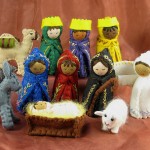
We celebrated Christmas Day in style this past Sunday with one of our largest-attended worship services of the year. What a joy it was to be in the Lord’s house on Christmas Sunday! In a sense, it’s a shame that this particular holiday (or “holy day”) falls on Sunday only once every several years.
I hope you had a positive experience during this season! Tara and I had a very good Christmas week. We shared Christmas meals with both sides of our family on consecutive days. We gave gifts, sang songs, and consumed cookies – all the components that add up to make a pleasant Christmas experience.
On our way home the other day, though, I found myself wondering something. We have just celebrated Jesus’s birthday once again (although, to be fair, we don’t know exactly which day of the year was his actual birthday). Jesus is, in a sense, a year older. (Although, to be fair again, Jesus is eternal; he has always existed as the second person of the Trinity, in fellowship with God the Father and God the Spirit since before the creation of the universe.) If Jesus is now a year older, so to speak, then what might he be thinking and feeling?
Birthdays often produce introspective, reflective, and pensive feelings in us. We marvel at how quickly time passes and, perhaps, evaluate whether or not the past year was “good.” We might even look toward the upcoming year and the opportunities it might present. Even if we celebrate our birthdays with family and friends, there comes a moment when each of us realizes, “I’m another year older.”
So Jesus is another year older. We celebrated his birthday with a beautiful worship service. After the celebration, though, we should pause to reflect: our Lord is another year older. How was this past year for him? How have we, his disciples, grown in relationship with him and with each other? How have we, his ambassadors to the world, worked to spread the good news of the kingdom of God to our neighbors? How have we, his hands and feet, shown mercy, love, compassion, and kindness to those in need? How has Jesus extended forgiveness, grace, mercy, and peace to us and those whom we know?
And then, the follow-up question: in each of these areas, what opportunities lie ahead for the year to come?
–Pastor David



